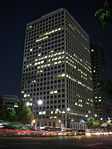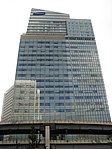Samsung
Samsung Group[3] (Korean: 삼성; RR: samseong [samsʌŋ]; stylized as SΛMSUNG) is a South Korean multinational manufacturing conglomerate headquartered in Samsung Digital City, Suwon, South Korea.[1] It comprises numerous affiliated businesses,[1] most of them united under the Samsung brand, and is the largest South Korean chaebol (business conglomerate). As of 2020, Samsung has the eighth-highest global brand value.[4]
This article is about the conglomerate. For the electronics subsidiary, see Samsung Electronics. For other uses, see Samsung (disambiguation).
Native name
삼성그룹
1 March 1938 in Daegu, Japanese Korea
Worldwide
Clothing, automotive, chemicals, consumer electronics, electronic components, medical equipment, semiconductors, solid-state drives, DRAM, flash memory, ships, telecommunications equipment, home appliances[2]
Advertising, construction, entertainment, financial services, hospitality, information and communications technology, medical and health care services, retail, shipbuilding, semiconductor foundry
Samseong
Samsŏng
Samsung was founded by Lee Byung-chul in 1938 as a trading company. Over the next three decades, the group diversified into areas including food processing, textiles, insurance, securities, and retail. Samsung entered the electronics industry in the late 1960s and the construction and shipbuilding industries in the mid-1970s; these areas would drive its subsequent growth. Following Lee's death in 1987, Samsung was separated into five business groups – Samsung Group, Shinsegae Group, CJ Group and Hansol Group, and JoongAng Group.
Notable Samsung industrial affiliates include Samsung Electronics (the world's largest information technology company, consumer electronics maker and chipmaker measured by 2017 revenues),[5][6] Samsung Heavy Industries (the world's second largest shipbuilder measured by 2010 revenues),[7] and Samsung Engineering and Samsung C&T Corporation (respectively the world's 13th and 36th largest construction companies).[8] Other notable subsidiaries include Samsung Life Insurance (the world's 14th largest life insurance company),[9] Samsung Everland (operator of Everland Resort, the oldest theme park in South Korea)[10] and Cheil Worldwide (the world's 15th largest advertising agency, as measured by 2012 revenues).[11][12]
Influence in South Korea
Samsung has a powerful influence on South Korea's economic development, politics, media and culture and has been a major driving force behind the "Miracle on the Han River".[53][54] Its affiliate companies produce around a fifth of South Korea's total exports.[55] Samsung's revenue was equal to 22.4% of South Korea's $1.67 trillion GDP in 2022.[56]
"You can even say the Samsung chairman is more powerful than the President of South Korea. [South] Korean people have come to think of Samsung as invincible and above the law", said Woo Suk-hoon, host of a popular economics podcast in a Washington Post article headlined "In South Korea, the Republic of Samsung", published on 9 December 2012. Critics claimed that Samsung knocked out smaller businesses, limiting choices for South Korean consumers and sometimes colluded with fellow giants to fix prices while bullying those who investigate. Lee Jung-hee, a South Korean presidential candidate, said in a debate, "Samsung has the government in its hands. Samsung manages the legal world, the press, the academics and bureaucracy".[57]
In Vietnam
In March 2008, Samsung received an investment certificate and began construction of its first mobile phone manufacturing plant in Vietnam, Samsung Electronics Vietnam (SEV) in Bac Ninh.[177][178][179] The project originally had an investment capital of 670 million USD, but it was quickly increased to 1.5 billion USD, then to 2.5 billion USD, nearly four times the original investment capital.[180][181][182][183]
In the period from 2018 to 2022, Samsung contributed over 306 billion USD in export revenue to Vietnam.[184][185] In 2022 alone, despite the impact of the COVID-19 pandemic, the figure reached 65 billion USD, contributing significantly to Vietnam's total export value, which for the first time exceeded the 700 billion USD threshold, reaching over 732 billion USD.[180]
In addition, Samsung has also brought Vietnamese businesses deeper into the global value chain and contributed significantly to the development of the electronics industry in Vietnam.[186][187][188] Currently, the number of Vietnamese first- and second-tier suppliers in Samsung's global supply chain has increased tenfold, from 25 businesses in 2014 to 257 businesses by the end of 2022.[189][190][180]
Controversies
Labor abuses
Samsung was the subject of several complaints about child labor in its supply chain from 2012 to 2015.
In July 2014, Samsung cut its contract with Shinyang Electronics after it received a complaint about the company violating child labor laws.[191] Samsung says that its investigation turned up evidence of Shinyang using underage workers and that it severed relations immediately per its "zero tolerance" policy for child labor violations.
One of Samsung's Chinese supplier factories, HEG, was criticized for using underage workers by China Labor Watch (CLW) in July 2014. HEG denied the charges and has sued China Labor Watch.[192][193] CLW issued a statement in August 2014 claiming that HEG employed over ten children under the age of 16 at a factory in Huizhou, Guangdong. The group said the youngest child identified was 14 years old. Samsung said that it conducted an onsite investigation of the production line that included one-on-one interviews but found no evidence of child labor being used. CLW responded that HEG had already dismissed the workers described in its statement before Samsung's investigators arrived.[191]
CLW also claimed that HEG violated overtime rules for adult workers. CLW said a female college student was only paid her standard wage despite working four hours of overtime per day even though Chinese law requires overtime pay at 1.5 to 2.0 times standard wages.[191]
In 2020, the Australian Strategic Policy Institute accused at least 82 major brands, including Samsung, of being connected to forced Uyghur labor in Xinjiang.[194]




